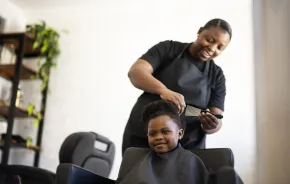
Overindulgence is a bad idea with most everything in life, and as you’ve probably realized by now, that smartphone you got your child is no exception.
That’s why you need to include something else within the “rules” of their new phone: the power of unplugging. Teaching your kids the importance of putting the phone down is as important as teaching them about online safety.
Study after study shows the positive effects of periodically “unplugging” from electronics and smartphones in particular, for both adults and kids.
In a 2014 study on 11-year-olds, 51 kids attended a technology-free camp for five days. Another group of 54 spent the same time period at school where life (and technology usaged) proceeded as normal.
The study found that the kids who “unplugged” had more overall energy and a great ability to read facial expressions and the emotions of others. In other words, they greatly improved their non-verbal cues, one of the things that measure our ability to have empathy and connection with others. (Some refer to it as emotional intelligence.)
Kate Unsworth, CEO of Kovert, a consumer and data gathering company that helps people detach from technology, conducted her own experiment on adults. In 2015, Unsworth handpicked a group of 35 CEOs and entrepreneurs for a trip to Morocco to study their behavior without technology. She also brought along five undercover neuroscientists to observe the group.
The first day, the group got to know each other with plenty of smartphone access. But the next four days were spent on a trip to the Moroccan desert that required all devices be left behind.
Not surprisingly, the neuroscientists noticed visible changes. After three technology-free days, members of the group had better posture as they began to look into each other’s eyes, rather than downward with a smartphone in hand. In other words, they became more open and engaging.
So how do we pry those phones out of our children’s hands? It may not be easy at first, but if you make it fun, it can be done. Plan a monthly “digital free” weekend (or at least one full day). You’ll be surprised at how good it is for your kids, and yourself. Here are some tips to help you get started.

1. Get moving
Leave the phones behind and go on a walk or a hike. Try a trail near you that you’ve never been on. Take a camera (the old-fashioned kind) and teach your kids how to use it.
2. Go for a ride
I used to love car trips as a kid. Here in the Pacific Northwest, we have so many great towns and islands to explore. If you make it a weekend or day trip, your kids will look forward to it, and with no phones in the car, you may even be able to teach them some of the car games you grew up with. Remember the license plate game? Here is a link to some great car ride games to jog your memory.
3. Create a culinary masterpiece
Bring a recipe along and spend a day at the farmers market. Your kids can actually learn where their food comes from while they get a cooking lesson (or give you one!). Once you have the ingredients, have everyone participate in making the meal. Even if you end up creating something inedible and ordering pizza instead, it’s a memory your family will cherish.
4. Remember paper?
How about spending a weekend on a family scrapbook project? You can each work on a few pages, decorating with photos, stickers and anything else from the local craft shop. Origami and paper-mâché are both a lot of fun too.
5. Be an old-fashioned gamer
Remember board games? We used to spend hours in front of the Monopoly board. Some of my fondest sibling memories came from a rousing round of Chutes and Ladders. You can even go “gaming” in Seattle. Find a local restaurant or bar where you can play board games.
6. Make a home movie
Get out a video camera and make some movie magic. You can even write a story and give every family member a part to play. You’ll have fun watching these for years to come.
7. Read paper books together
There’s something about reading a real book that you just don’t experience with an electronic device. Bring the kids to a bookstore or library. Better yet, share one of your favorite dog-eared novels that you could never part with.
8. Spend the day visiting grandparents or an elderly person
We can learn so much from the generations before us. Have a conversation with an elderly loved one about the past. Your kids will learn to love and appreciate learning about where they came from (and what it was like in the days before smartphones).
For more information on how you can be a guide for your child through the responsibility of a smartphone as well as a detailed “roadmap” for the journey, download our free guide.
Read the rest of the series: Week 1, Week 2, Week 3, Week 4 and Week 5.











